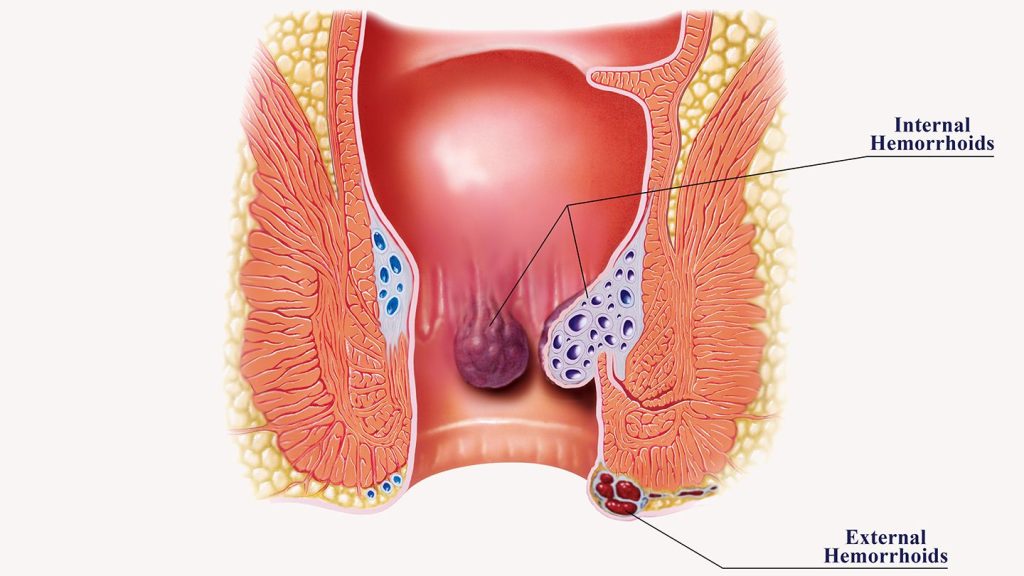Piles, also known as haemorrhoids, are swollen veins in your lower rectum and the anus. They are usually known to develop inside the rectum or even under the skin that is around the anus. Both men and women are said to be victims of this problem from time to time.
There are a number of causes or symptoms of piles in females, but most of the time, the reasons are said to be unknown. But you must know that proper solutions are available to treat piles, and many people are often relieved with lifestyle changes and home treatments.
What Are the Symptoms?
The signs and symptoms of piles usually depend on the type of haemorrhoid you are suffering from. The various types of piles or haemorrhoids are as follows:
- External haemorrhoids
These are piles under the skin around the anus. The signs and symptoms can include the following:
- Any type of pain or discomfort
- Swelling around the anus
- Bleeding
- Irritation or itching in your anal region.
- Internal haemorrhoids
Though you cannot see or feel these piles usually lie inside the rectum. But they rarely cause any form of discomfort. But if you have irritation or strain when passing stool, it usually leads to the following:
- There is painless bleeding during bowel movements, and there are chances that you may notice tiny amounts of blood in the toilet or in your toilet tissue.
- Haemorrhoid that pushes through the anal opening can lead to pain and irritation.
- Thrombosed haemorrhoids
If the blood pools in this haemorrhoid and form a lot of clots, it can result in the following:
- Swelling
- Inflammation
- A lot of pain
- A hard lump near the anus.
When Should You Opt to Visit a Doctor?
If you are experiencing bleeding during bowel movements or are suffering from piles that do not improve after a week of care at home, you must talk to your doctor. You should not simply assume that haemorrhoids cause rectal bleeding, and this is especially when you have changes in bowel habits or if the stools have differences in colour or consistency. Rectal bleeding can also occur with other diseases that include anal cancer or colorectal cancer. If you are witnessing symptoms of piles in females or there are more significant amounts of lightheadedness, rectal bleeding or dizziness, you must opt for emergency care.
What Are the Causes?
The veins around your anus usually stretch under pressure and might swell or bulge. Piles or haemorrhoids can also result from enhanced pressure in the lower rectum due to the following:
- If you are obese
- If there is straining during bowel movements
- If you are sitting for extended time periods on the toilet
- If you are suffering from constipation or chronic diarrhoea
- If you are pregnant
- If you are consuming a low-fibre diet
- If you are lifting heavy regular.
What Are Some Risk Factors?
As your age increases with time, your risk of suffering from piles increases. This is because the tissues that support your veins in your rectum or anus may weaken or stretch. This can also occur if you are pregnant, as the baby’s weight leads to more pressure in the anal region.
What Are the Complications?
The complication of piles can be rare, but they include the following:
- Anaemia: it is rare, but chronic blood loss from piles can lead to anaemia; in this condition, you’ll lack sufficient healthy blood cells that carry oxygen to your cells.
- Strangulated piles or haemorrhoids: If the blood supply to an internal haemorrhoid is cut off, the haemorrhoid might be strangulated, and this can cause the individual a lot of pain.
- Blood clot: At times, a lot of clots can form in thrombosed haemorrhoids. Though it is not dangerous, it will be painful and may require to be drained and lanced.
How to Prevent It?
The ideal way to prevent piles is to keep the stools soft so they can easily pass. To prevent and reduce the symptoms of piles, you can follow these tips:
- You must consume high-fibre foods: In such cases, the best thing to do is to consume more vegetables, fruits or whole grains. When you do so, it can help soften your stool, which causes piles. You must slowly add fibre to your diet to avoid gas problems.
- Drink a lot of fluids: You can drink at least six glasses of water and other liquids to keep the stools soft.
- Do not strain: When you hold your breath or strain when looking to pass a stool, it causes more pressure in the lower rectum’s veins. You can also choose to exercise daily to avoid pressure and constipation.
Get the Best Doctors from Apollo Hospital
If you are suffering from piles and notice symptoms of piles in females, you can consult a reputed doctor in your area. It is best not to underestimate these problems as they can take turns for the worse in the future. You can associate with the experts of Apollo Hospital and visit the Ask Apollo website today to opt for professional help to deal with such issues.

